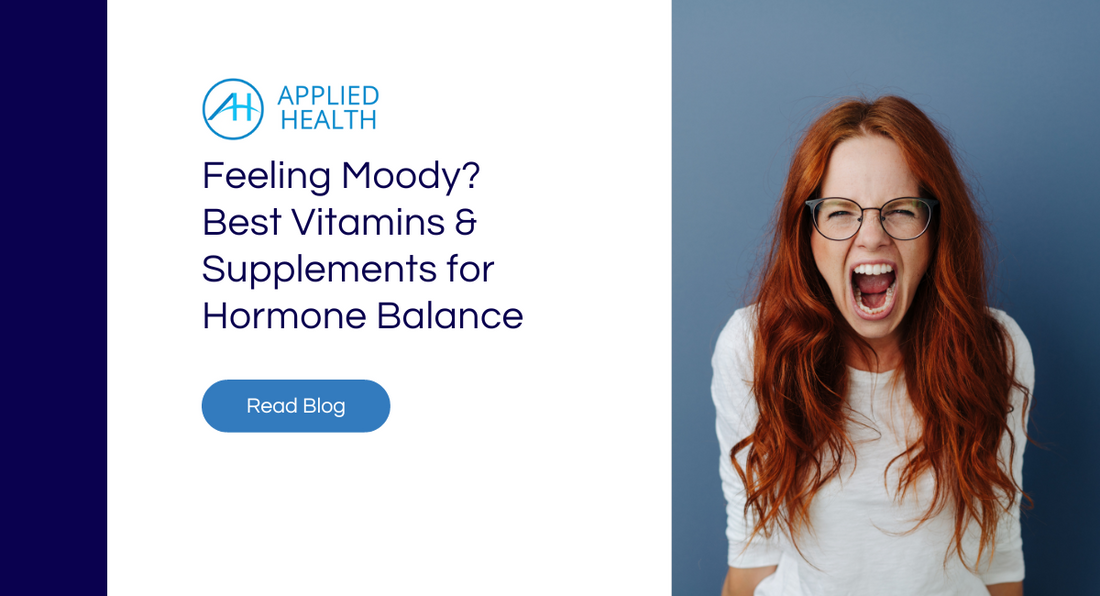Searching for the best vitamins and supplements for hormone balance can feel like a complex maze of information.
Hormone imbalances can really knock you off your feet, right? Like a rollercoaster that won't stop, the ups and downs of hormonal swings can leave you frustrated and exhausted.
Fortunately, certain nutrients can help lay the foundation to support healthy hormones.
Let's take a closer look at the best vitamins and supplements for hormone balance.
Understanding Hormonal Imbalances
Hormones can feel off balance for a variety of reasons — stress, poor diet, nutrient deficiencies, lack of exercise, disrupted sleep, and aging.
When your body's hormones are disturbed you may not feel like yourself struggling with greater fatigue, mood swings, foggy thinking, and an overall sense of "blah".
Table Of Contents:
- Symptoms and Contributing Factors
- The Role of Vitamin D3 in Hormonal Balance
- The Benefits of B Vitamins for Hormone Regulation
- Testosterone and Omega-3s: A Dynamic Duo?
- Cortisol Control? Count Me In.
- The Role of Magnesium in Hormonal Health
- Regulating Hormone Production
- Probiotics and Hormone Balance
- FAQs: Best Vitamins and Supplements for Hormone Balance
- Conclusion
Symptoms and Contributing Factors
How do you know if your hormones are playing a sour note? Common symptoms include fatigue, mood swings, weight changes, and skin issues.
An unhealthy gut microbiome could lead to hormone imbalance because the gut microbiome is needed to help metabolize hormones. And let's not forget about sleep – its importance in hormone regulation cannot be overstated.
Maintaining Balance Through Lifestyle Choices
A balanced diet is key to hormone health. Consuming a selection of fruits, veggies, and lean proteins can give your body the nourishment it needs to help create hormones.
Besides food choices, physical activity plays a significant role. Regular workouts help regulate insulin levels and other important hormones.
The Importance Of Good Sleep Habits
You may think skipping on sleep gives more time for productivity but doing so can cause hormone imbalances. Research shows a link between inadequate rest and unhealthy cortisol (the 'stress' hormone) levels which affects overall well-being.
Nurturing A Healthy Gut Microbiome For Hormone Health
Studies have shown a healthy gut microbiome is crucial for hormone balance. Probiotics and prebiotics can help maintain this, along with avoiding overly processed foods.
To sum up, hormonal imbalances aren't just about hormones themselves – they're also linked to your lifestyle choices.
So, dietary choices should not be overlooked.
The Role of Vitamin D3 in Hormonal Balance
Our bodies are a marvel, but sometimes they need a little help to stay on track.
Enter vitamin D3. As the "sunshine vitamin", its benefits extend far beyond mood-lifting powers.
Vitamin D3 plays an essential role in hormone balance and fertility health. So important is this sunshine soldier that over 40% of us who lack enough may sense life is out of balance.
How to Address Vitamin D Deficiency
Catching some sun rays daily, especially between 10 AM and 4 PM, can significantly increase your body’s natural production of vitamin D. Remember though, moderation is key - too much sun exposure can lead to skin damage.
Your diet also plays a crucial role in Vitamin D3: fatty fish like salmon and mackerel are rich sources. Supplements can also be a great option if sunlight or diet aren’t cutting it.
The Benefits of B Vitamins for Hormone Regulation
Moving from one powerhouse vitamin to two others — Vitamin B6 and Vitamin B3.
Vitamin B6, also known as Pyridoxine, is an all-star for hormones. Studies show doses up to 100 mg/day can help with PMS symptoms.
Why? Because it helps regulate mood-altering chemicals like serotonin and dopamine.
Niacin (or Vitamin B3) isn't just an ordinary nutrient either; it's working behind the scenes to support many functions in the body.
This vitamin is converted into coenzyme NAD in our bodies – something over 400 enzymes need to function properly. Now if that doesn’t scream 'essential' nothing else will.
How to Fit More B Vitamins into Your Diet
B vitamins are found in plenty of foods - from whole grains and eggs to leafy greens and meats. But even if you’re chowing down on these regularly, there’s no guarantee you’ll get enough because cooking can often deplete their levels.
If your diet lacks these foods, or if stress has left your body craving extra support, Complex B Vitamin supplements can help fill in the gaps to offer a solid dose of both Vitamin B6 and Niacin, along with other essential B vitamins.
By selecting a Complex B Vitamin that meets your daily needs, you can ensure the right balance of nutrients.
The Impact of Omega-3 on Hormone Levels
Let's talk fish, folks. The fatty kind we eat can play a big role in hormone health.
Testosterone and Omega-3s: A Dynamic Duo?
You might be astounded to discover that fish oil has been associated with testosterone levels. In fact, studies show that Omega-3 fatty acid supplementation helps restore the balance of healthy testosterone levels.
A research article published by The Journal of Clinical Endocrinology & Metabolism noted significant increases in luteinizing hormone (the stuff that signals your body to make more testosterone) following regular intake of Omega-3 supplements.
Cortisol Control? Count Me In.
Now for some stress-busting news: Regular consumption of Omega-3s can also help manage cortisol levels – yup, that’s the infamous ‘stress hormone’.
When our cortisol gets out of whack it can cause sleep disturbances, weight gain, and even mood disorders.
Research suggests that Omega-3s can help keep this hormone in check. One study showed a decrease in cortisol levels following six weeks of regular Omega-3 supplementation.
The Role of Magnesium in Hormonal Health
We often overlook magnesium's contribution to our overall well-being. It regulates hundreds of biochemical reactions in our body—including hormone production.
Got mood swings? Fatigue? Difficulty sleeping?
A magnesium deficiency could be the silent culprit.
Menopause and Magnesium
Women experiencing menopause may particularly benefit from magnesium. During menopause estrogen levels decline rapidly which causes calcium loss—something that magnesium can help mitigate by improving bone density.
Regulating Hormone Production
Magnesium aids in the production and regulation of hormones. This includes stress hormones like cortisol, thyroid hormones which control metabolism, and sex hormones such as estrogen and testosterone. A study published by the National Institutes of Health found that magnesium deficiency can lead to imbalances in these essential hormones.
Balancing Blood Sugar Levels
This mineral also helps regulate blood sugar levels by improving insulin function. When your blood sugar levels are balanced, your hormone levels tend to be more stable too. According to research from Diabetes Care Journal, low magnesium intake is associated with increased incidence of insulin resistance - a major factor for hormonal imbalance.
Promoting Better Sleep Quality
In addition, magnesium promotes better sleep quality – another crucial aspect for maintaining healthy hormone levels. The mineral does this by supporting the production of melatonin (the sleep hormone), thus helping us achieve restful nights' sleep which consequently supports optimal hormonal health. Research has shown how lack of quality sleep can throw off our hormonal system possibly leading to weight gain and mood swings among others.
Magnesium can be found in nuts, seeds, bananas, fish, and whole grains. But despite best efforts, we sometimes fall short with diet alone.
This is where supplementation comes into play.
Here are some guidelines:
- The recommended daily intake of magnesium for adults is between 310 and 420 mg.
- You can find magnesium supplements in various forms like citrate and glycinate.
Probiotics and Hormone Balance
Let's talk about your gut. Not referencing the little bulge people try to get rid of - we're talking about the billions of bacteria living in your digestive tract. Yeah, sounds a bit creepy when you put it like that but these tiny tenants can have a big impact on hormone balance.
Your body is one intricate network where everything is interconnected. This includes hormones, those biochemical messengers calling shots on how your body functions from mood regulation to metabolism speed. And yes, probiotics come into play here too.
Selecting the Right Probiotic Supplement
The market today offers an overwhelming array of probiotic supplements which makes choosing just one seem like solving a Rubik's cube blindfolded. But fear not – let me give you some guidance based on my personal experience and research.
Firstly, look for multi-strain products as they offer diverse benefits across various health areas including hormonal health.
Secondly, ensure the product has sufficient colony-forming units (CFUs). A decent supplement should contain at least 1 billion CFUs per dose. If this feels too sciency for comfort then think about it this way: You wouldn't throw just one seed into a field and expect an abundant harvest right?
Ever heard that probiotics can help balance your hormones? It's not just for gut health. Actually, one study revealed a 12-week course with particular strains boosted androgen levels while reducing sex hormone binding globulin (SHBG).
FAQs: Best Vitamins and Supplements for Hormone Balance
What vitamin is good for hormonal imbalance?
Vitamin D and B vitamins, particularly B6 and Niacin (B3), play crucial roles in maintaining hormone balance.
What supplements help hormone levels?
Omega-3s can support healthy testosterone, insulin sensitivity, and cortisol management. Probiotics also positively affect certain hormones like androgens.
How can I improve my hormonal balance?
Beyond essential nutrients, regular exercise, sound sleep habits, and a balanced gut microbiome are keys to improved hormonal health.
What vitamins help hormonal belly fat?
Magnesium aids in regulating blood sugar levels that could otherwise lead to the storage of belly fat. Omega-3 helps reduce inflammation associated with obesity too.
Conclusion
Who knew the road to support happy hormones could be paved with vitamins and supplements? It's a game-changer, isn't it?
Remember that while Vitamin D3 plays a vital role in fertility and reproductive health, over 40% of us are deficient in this vitamin.
B Vitamins have also taken center stage for their part in hormone regulation. And Omega-3s, they're key players in managing testosterone levels and cortisol.
Magnesium should not be forgotten either as half of us need more of it for our hormones to function well. Last but not least, we discovered probiotics can help balance hormone regulation.
Adding these best vitamins and supplements for hormone balance into your routine might be just what you need. So go ahead - take control of your hormonal health today.

